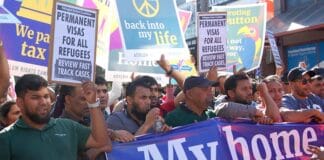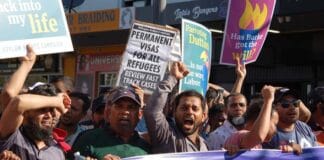The dramatic events surrounding a boat of Afghan asylum seekers at risk of sinking off the Indonesian island of Sumbawa has revealed how Rudd’s demonisation of people smugglers is putting the lives of asylum seekers at risk.
It was sheer luck that a small Indonesian fishing boat was able to get the asylum seekers to land. For four days the boat drifted, although the Australian Federal Police, the Indonesian police, the International Organisation of Migration and the UNHCR all knew that the boat was in trouble the first night that the engine stopped.
But no one came to help. The Australian authorities knew that Indonesia wasn’t helping and they still did nothing. This is all bad enough. But it is Australia’s border protection policies that are forcing people to use people smugglers and more risky boats.
But even as the boat was at risk of sinking, the asylum seekers pleaded by mobile phone text messages not to be taken by Indonesian police.
Indonesia is being paid tens of millions of dollars to warehouse asylum seekers that are Australia’s responsibility. There are some in Indonesia who were on boats turned back from Australia in 2001 following the infamous Tampa incident.
There are Australian Federal police all over the Indonesian archipelago to gather information and encourage the Indonesian police to intercept, detain and harass asylum seekers. The Rudd government refuses to process asylum seekers in Indonesia or Malaysia. Desperate asylum seekers are being forced to use boats that are less prepared for the risky boat trip to Australia.
Rudd’s anti-people smuggling rhetoric may not be quite as bad as demonising asylum seekers themselves but it ultimately serves the same purpose. His wild outburst in April, calling people smugglers “the vilest form of life on earth” would be farcical if the consequences were not so serious.
Rudd, like Howard, wants to be seen to be tough on refugees and tough on border protection. In the end, it sends the same domestic message—asylum seekers aren’t really welcome. Worse, the policy is putting asylum seekers’ lives at risk.
In fact Rudd’s refugee policy is still underpinned by the same ideology and policies as Howard’s—mandatory detention, offshore processing (Christmas Island has replaced Nauru, but asylum seekers still can’t access Australian law unless they get to the mainland), and border protection. The remoteness of Christmas Island means there is no transparency to its operations.
Rather than challenge the anti-refugee sentiments whipped up throughout the Howard years and still pushed by the present crop of Liberals, Rudd is still concerned to appease any lingering anti-refugee sentiments and outflank the Liberals from the right.
The hundreds of millions of dollars being spent on border protection deals with Indonesia and Malaysia could be spent processing asylum seekers. A boatload of Afghan asylum seekers sank off Indonesia in May. Another boat came dangerously close in July.
There will be more boats. There are 300,000 Tamils in prison camps in Sri Lanka. The wars in Afghanistan and Pakistan are getting worse. To get to safety they will have to use people smugglers.
The Rudd government has introduced some welcome changes to refugee policy. Refugees now get permanent visas. But the promise of “no children in detention” means little when Christmas Island is little more that a detention centre, or they are rotting in Indonesia or risk being drowned at sea.
By Ian Rintoul





